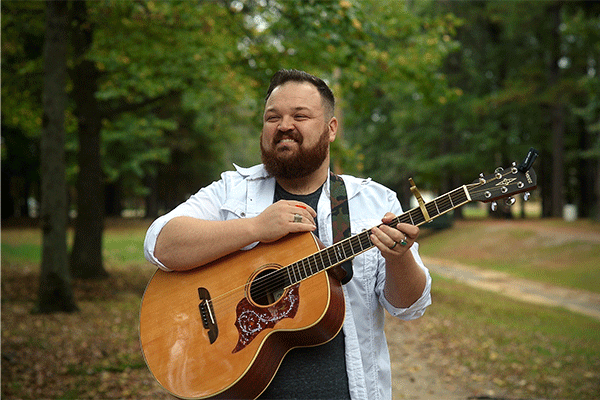
Will Stults' Story
By: Mental Health Association
Standing in the room where people gathered to share their struggles, their triumphs and their lives, the 6’2” 307-pound man felt weak.
“It felt so weak to have to say there is something wrong with me. In hindsight, other people haven’t seen it that way, they’ve seen it as a strength. I think people are becoming more aware that admitting you need help is one of the strongest things you can do,” Will Stults said.
For Stults, who lives with bipolar II disorder, help came, in part, from the Mental Health Association in Morgan County. The Decatur-based nonprofit organization and partner agency of United Way of Morgan County offers support groups for individuals living with mental illnesses.
Surrounded by others living with bipolar disorder and depression, Stults found acceptance and accountability. Twice a month, he travels more than two hours roundtrip to attend the meetings.
“I think there’s a stigma around going to group. For me, it’s much better to hear about other people’s experiences. There’s like a camaraderie of not feeling alone or like I’m the only one having this struggle. And for so long I felt that way,” said Stults, who lives in Russellville and works in Athens.
Susan Claborn, director of MHA, has witnessed Stults growth first hand.
“Having men step up and talk about mental illness is tremendous. The conversations they have are not all about mental health. They talk about the daily stuff. They talk about their lives. For many of them, group is the only place they feel comfortable talking about these issues,” Claborn said.
Along with attending group, Stults takes medication and lives a healthy lifestyle to face the mental illness battled by many generations of his family.
“I’m the fourth generation. I don’t know if the word ‘bipolar’ went as far back as my great grandmother, but from her behavior it sounds like the same thing.”
As a child, Stults remembers feeling different – happier in the spring and summer and depressed in the fall and winter. In the fall of 2018, after 25 years of running from the illness, Stults faced the diagnosis.
“I’ve suspected for a while that I was bipolar II, but I was kind of in denial about it. I was scared to get help. I thought I would lose my sense of spirituality, my creativity and my personality,” said Stults, a singer-songwriter. “But I don’t feel disconnected from God and I don’t feel like my creativity suffered. I feel like it’s given me the space, mentally, to figure out who I am.”
Unlike individuals with bipolar, who experience mania, people diagnosed with bipolar II experience hypomania. During his high phase, Stults would feel really productive, lose weight without trying and thrive on 3 hours of sleep a night.
“When I was up, it seemed like my mind was constantly racing. I was having six or seven thoughts for every person’s one,” Stults said.
And then, as the cooler temperatures of fall arrived, he would crash. The crash in 2018 was hard. He knew he needed help.
In early 2019, six weeks after he started taking medication, the thoughts running through Stults’ mind quieted.
“I was putting on my shoes and 40 percent of my mental noise went away. It felt like a miracle. I couldn’t imagine having that much peace of mind,” Stults said. “I think with mental illness the fear is always getting to a point where you are so unstable you won’t do anything because your judgement isn’t sound. I almost got there.”
This is the first fall of Stults’ life that he feels stable and that everything’s normal.
“The thing I’m happiest about is when my 13-year-old son said, ‘Dad, you are so much more polite and when I’m talking, I can tell that you’re listening to me know.’ My wife and my son both say they don’t have to walk on eggshells around me anymore because they would never know if I was up or down,” Stults said.
While the medication helped still his mind, the MHA support group provides Stults with continued emotional and mental support.
“Bipolar people, a lot of times, get stable and think they don’t have to take their medication. That’s what’s great about group. They hold me accountable. They can tell if I’m acting different. Having people who are comfortable enough to say, ‘I don’t think you’re doing that great right now,’ is so important,” Stults said.
By speaking out about his experiences, Stults hopes to reach others battling mental illnesses.
“If I had known one person that had gotten help and it had done something good for them, I think I would’ve gotten help years before. I feel like I wasted 15 years of adulthood,” Stults said. “I’m a big God guy. All of this feels like a big gift, like a huge miracle that I can use to reach others. I feel like it would be blasphemy to not tell other people about my experience. I can’t change who I am. I can’t change that I have a mental illness. All I can do is present who I am.”
United Way, along with our 30 partners, fights for the health, education, and financial stability of every person right here in Morgan County.
When you support United Way of Morgan County through your workplace campaign or through a corporate or individual gift, you are helping the most vulnerable among us…the young, the old, the sick, and the poor as well as those affected by both man-made and natural disasters. Those people are your neighbors, your co-workers, your family members, and your friends.
United, we can win the fight! Won’t you join us?! www.uwmcal.org
